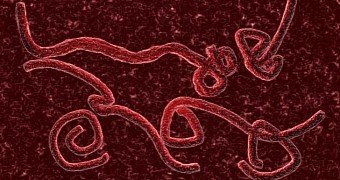A paper published in the journal Nature this past August 29 documents the use of a new and experimental drug to successfully treat monkeys infected with the Ebola virus.
The paper was published the day after the World Health Organization announced that, given the severity of the ongoing Ebola outbreak in West Africa, about 20,000 people were likely to be infected before the epidemic was contained.
Writing in the journal Nature, the scientists behind this research project explain that the drug tested in this series of experiments on monkeys is dubbed ZMapp. It is made by Mapp Pharmaceutical in San Diego, California, US.
Information shared with the public says the drug is basically a cocktail of three antibodies that fight the Ebola virus. During this clinical trial, ZMapp proved capable of delivering complete protection against the deadly disease.
Hence, specialists say that, all things considered, it might be possible to use this drug to treat people infected with the Ebola virus and help contain West Africa's ongoing epidemic. More so since the World Health Organization has given the green light to ZMapp.
As part of this investigation into ZMapp and its abilities to fight the Ebola virus, scientists administered the drug to a total of 18 monkeys. Some of these animals received this treatment on day three or four of infection. Others were given the drug five days after infection.
Despite the fact that they all displayed Ebola disease symptoms, i.e. bleeding, elevated liver enzymes, and rashes, the monkeys all managed to shake off the disease. Simply put, the drug helped the animals recover from the infection and even reversed their symptoms.
By comparison, three monkeys that did not receive any treatment and that served as a control group passed away about a week following infection. Consequently, ZMapp is now hailed as a highly efficient drug when it comes to treating Ebola disease.
The problem is that the virus strain that this drug made mincemeat of during this clinical trial on monkeys is not the same as the one responsible for the epidemic in West Africa. Hence, specialists have no way of knowing whether the drug will be as efficient when used to treat human patients.
Still, experts with the World Health Organization say that, all things considered, perhaps it might not be such a bad idea to administer it to people. They argue that, since no proven cure for Ebola is currently available, offering this treatment option is better than offering no treatment option at all.
The bad news is that, for the time being, Mapp Pharmaceutical claims to have exhausted its Zmapp stocks. Thus, the company says it has until now made limited doses of this drug, and that these doses were all intended for research processes. Making more of it will take time and require large-scale facilities.

 14 DAY TRIAL //
14 DAY TRIAL //